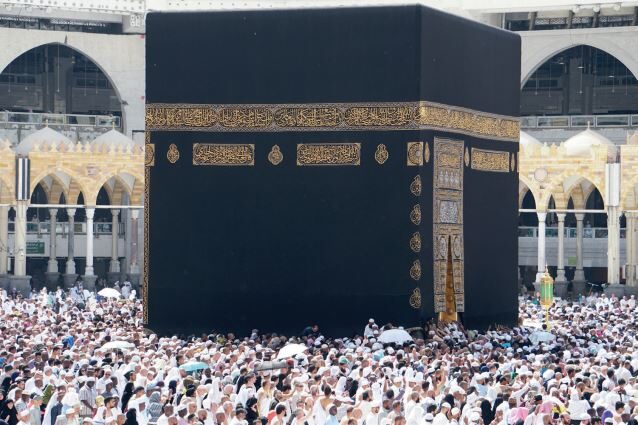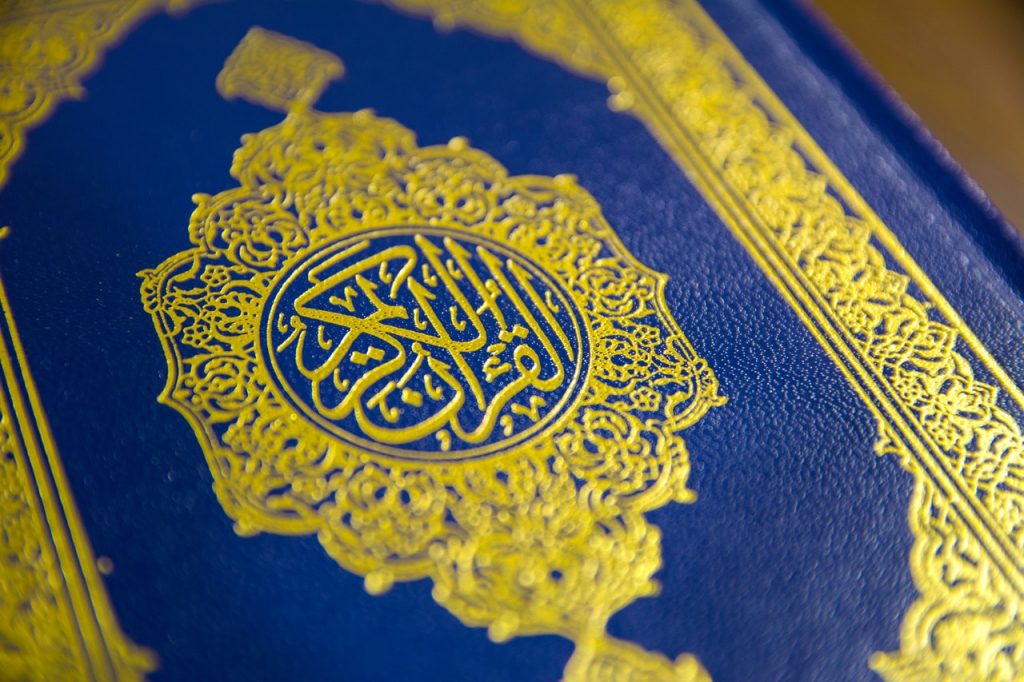Jalees Ahmad, Al Hakam

Hajj, the pilgrimage to Mecca, is the fifth pillar of Islam. Muslims from around the world make this journey every year to Mecca in the last month of the Islamic calendar, known as Dhul-Hijjah. It is compulsory for Muslims who meet the conditions of Hajj to perform it at least once in their lives. Hajj takes place between the 8th and 12th of Dhul-Hijjah. Hajj is a sunnah of the Holy Prophetsa, who performed Hajj once in his life.
The history of Hajj is closely linked to that of Abrahamas, Ishmaelas, and Hagarra. (For further details, see: Al Hakam issues of 17 and 24 February 2023 and 16 July 2023)
The Holy Prophetsa is reported to have said that Islam is built upon five pillars: (i) worshipping Allah alone and rejecting all other gods; (ii) establishing prayer; (iii) Zakat; (iv) performing the Pilgrimage to the House of Allah; and (v) fasting during Ramadan. (Sahih Muslim, Kitab al-iman, Hadith 16b)
In the Holy Quran, regarding Hajj, we read:
“And complete the Hajj and the ‘Umrah for the sake of Allah: but if you are kept back, then [make] whatever offering is easily available; and do not shave your heads until the offering reaches its destination. And whoever among you is sick or has an ailment of the head, [should make] an expiation either by fasting or almsgiving or a sacrifice. But when you are safe, then he, who would avail himself of the ‘Umrah together with the Hajj, [should make] whatever offering is easily obtainable. But such [of you] as cannot find [an offering] should fast three days during the Pilgrimage, and seven when you return home; these are ten complete. This is for him whose family does not reside near the Sacred Mosque. And fear Allah and know that Allah is severe in punishing.” (Surah al-Baqarah, Ch.2: V.197)
Hajj: step-by-step
The above-quoted verse mentions commandments regarding Hajj. Before we briefly delve into what the verse entails, it is important to understand how Hajj, or the Pilgrimage, is performed:
(1) Upon reaching the designated miqaat (locations where the pilgrim assumes ihram), the pilgrim enters the state of ihram. These locations are situated outside the haram, but are specifically designated for this purpose.
Note: The miqaat slightly varies in distance depending on the direction from which one travels.
(2) The male pilgrim removes his regular clothing and assumes the ihram while leaving the head uncovered. The female pilgrim has the option of wearing the usual yet simple attire while keeping her face uncovered.
(3) The haji is required to recite the following repeatedly:
لَبَّيْكَ اللّٰهُمَّ لَبَّيْكَ، لَبَّيْكَ لاَ شَرِيكَ لَكَ لَبَّيْكَ، إِنَّ الْحَمْدَ وَالنِّعْمَةَ لَكَ وَالْمُلْكَ، لاَ شَرِيكَ لَكَ
“My Lord! I am at Thy service. There is no equal or partner with Thee. So, I am at Thy service alone. All praise belongs to Thee and all blessings are from Thee and all authority rests in Thee. I say again that, there is no equal or partner with Thee. So I am at Thy service alone.” (Sahih al-Bukhari, Kitab al-Haj, Hadith 1549)
(4) Upon arriving at Mecca and seeing the Holy Ka’bah, one should pray, as this is an opportunity for acceptance of prayer.
The initial action taken by the pilgrim is to complete seven circuits around the Holy Ka’bah. The pilgrim then walks briskly or runs between Safa and Marwah, repeating this action seven times.
(5) On 8 Dhul-Hijjah, the pilgrim departs from Mecca in the morning and heads towards Mina. Upon reaching Mina, the pilgrim remains there to perform the five daily prayers at their designated times, beginning with the midday prayer.
(6) The following morning, 9 Dhul-Hijjah, the pilgrim begins their journey from Mina after offering the Fajr Prayer. They pass through, or by, Mash‘arul-Haram and continue towards Arafat. However, prior to officially entering Arafat, the pilgrim combines the midday and afternoon prayers.
(7) Following sunset, the pilgrim proceeds back to Muzdalifah or Mash‘ar, where they combine the evening and night prayers and spend a significant portion of their time on prayer and contemplation during this period.
(8) The following day, 10 Dhul-Hijjah, the pilgrim commences their journey back to Mina after performing the morning prayer at Mash‘arul-Haram. Upon reaching Mina, the pilgrim casts seven pebbles at the three designated pillars, beginning with Jamratul-‘Aqabah. This is repeated daily during the pilgrim’s stay in Mina.
(9) On the same day, 10 Dhul-Hijjah, the pilgrim offers their sacrifice, followed by the act of shaving their head. Then, the pilgrim takes a bath and changes into their regular clothing.
(10) The pilgrim then advanced towards Mecca and once again makes seven circuits of the Holy Ka’bah. After this, the pilgrim has the option to return to Mina if they choose to do so.
(11) The duration of the stay at Mina can vary, ranging from a portion of a day up to three or four days. This is what is referred to as ایام معدودات. This marks the completion of the Hajj.
Throughout this entire period, the pilgrim is encouraged to repeat the aforementioned prayer as frequently as possible. (The above has been explained in detail in Tafsir-e-Kabir and the Five Volume Commentary under Surah al-Baqarah: Ch.2: V.197)

Some points mentioned in verse 197 of Surah al-Baqarah
1. Fulfilling the Hajj and ‘Umrah for the sake of Allah
The first point to ponder over is that God states: “And complete the Hajj and the ‘Umrah for the sake of Allah.”
The verse emphasises the importance of fulfilling the obligations of Hajj and ‘Umrah for the sake of Allah. This highlights the significance of performing these acts of worship as a means of devotion and submission to Allah.
2. “If you are kept back, then [make] whatever offering is easily available; and do not shave your heads until the offering reaches its destination.”
If the pilgrim is unable to visit the Holy Ka’bah for Hajj or Umrah due to illness, or war is hindering his path, or other reasons, then, in such a scenario, they can stop and offer the sacrifice “whatever offering is easily available” (2:197) and leave the matter to Allah. You should not “shave your heads until the offering reaches its destination” (2:197). If the offering cannot be sent to Mecca, it can be performed where the pilgrim is residing, and the meat can be consumed or distributed. “It will be noted that the offering of a sacrifice is obligatory only when a would-be pilgrim is prevented from completing his Hajj or ‘Umrah. In ordinary circumstances, when a person performs a Hajj or an ‘Umrah separately, it is only supererogatory, becoming obligatory only when the Hajj and the ‘Umrah are combined.” (Five Volume Commentary, under Surah al-Baqarah, Ch.2: V.197)
3. “And whoever among you is sick or has an ailment of the head, [should make] an expiation either by fasting or almsgiving or a sacrifice.”
This verse caters to different categories of people who, due to illness, cannot shave their heads. It provides three alternatives, namely, (i) fasting; (ii) almsgiving; and (iii) sacrifice. Fasting can cater to the poor; feeding the needy caters to the middle class; and offering a sacrifice caters to the rich.
Though this verse of the Holy Quran does not specify the requirements for the duration of fasting, the number of needy individuals to be fed, or the type of animal to be sacrificed, we may infer this from other verses of the Holy Quran or the ahadith. In one narration, for instance, the Holy Prophetsa prescribed fasting for three days, feeding six poor individuals, and offering a goat as a sacrifice. This narration can be found in the collection of Imam Bukhari. (Sahih al-Bukhari, Kitab al-tafsir, Hadith 4517)
4. “But when you are safe, then he, who would avail himself of the ‘Umrah together with the Hajj, [should make] whatever offering is easily obtainable.”
Following the normal sequence of the verse, we read, “When you are safe”. This phrase refers to a situation in which war or other obstacles have ceased to exist. In such circumstances, individuals have the option to travel to Mecca with the intention of performing the ‘Umrah pilgrimage and then continue to stay in order to perform the Hajj in the following month of Dhul-Hijjah. This is also known as Hajj at-Tamatu‘. In this scenario, we read that such a person should make “whatever offering is easily obtainable.”
5. Fast for “three days during the Pilgrimage, and seven when you return home; these are ten complete.”
In the last part of the verse, Muslims are told that those who cannot find an offering to sacrifice should then fast for three days during the Hajj and then, upon reaching home – that is after taking the ihram off – they complete seven fasts at home. Making a total of ten.

